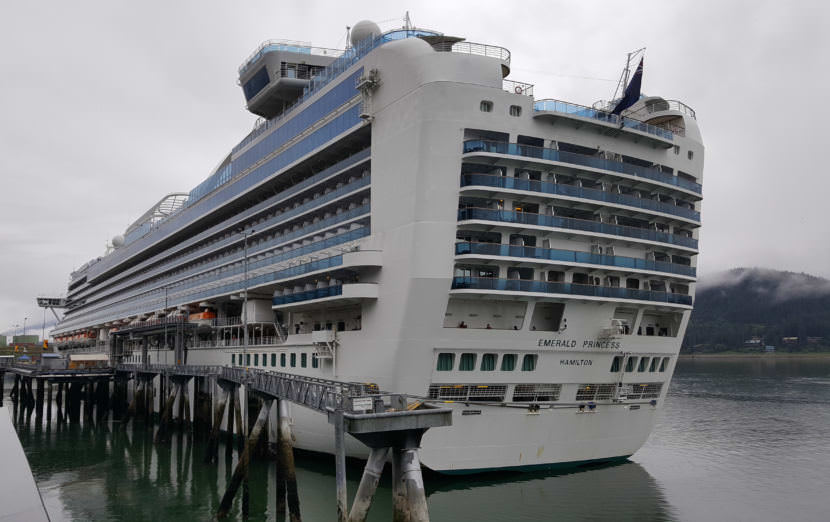
When cruise ships dock in Juneau, a few of them can connect to the city’s electric grid. That means less emissions and pollution downtown in the summer. It also generates money for Juneau’s hydroelectric utility that, in turn, benefits customers.
That’s why the City and Borough of Juneau wants to explore expanding port infrastructure to allow more ships to hook up.
Since 2001, Princess Cruises has been connecting to shore power at the Franklin Street dock during the summer cruise season.
“A lot of people don’t realize, this was the first place in the world (to offer shore power to cruise ships),” said Kirby Day, who works for Princess Cruises out of Juneau. He spoke about the benefits at a recent community meeting with the Alaska Department of Environmental Conservation.
“It’s been a great program and a great asset to the community, as well as Princess,” Day said.
Connecting to renewable hydroelectric power allows ships to shut off their engines. That cuts down on emissions from burning diesel fuel while they sit in the harbor.
Day estimates that Princess pays Alaska Electric Light & Power about $1 million each summer for shore power. The money acts as a rebate for Juneau customers, who then receive a discount on their monthly energy bills.
Today, ports around the world offer electric hookups for cruise ships. But Juneau still only has one dock capable of supplying power.
That’s why the Juneau Commission on Sustainability submitted a proposal this year for the city to expand that infrastructure. It suggests using $3.5 million in revenue from Juneau’s marine passenger fee. That’s the $5 head tax cruise passengers pay when they visit Juneau.
A separate recommendation from City Manager Rorie Watt suggests using $250,000 in fees to study the concept further.
While there are obvious benefits to shore power, it’s not a simple proposal.
For one thing, building the infrastructure is expensive, and the cruise season only lasts about four months.
A feasibility study from 2016 estimated building a new facility to provide shore power from just one additional dock would cost $12.9 million.
Alec Mesdag works for AEL&P. The company use surplus hydroelectric energy generated from reservoirs around Juneau to provide power to interruptible customers like Greens Creek Mine, the downtown Hurff Ackerman Saunders Federal Building and Princess Cruises.
“In general, the capacity in that time of year is fine,” Mesdag said. “The energy would depend on how much precipitation had fallen.”
Right now, both Greens Creek and the Federal Building are running on fuel-powered generators. That’s due to low rainfall last year and so far this winter. It’s also led to an increase in prices for Juneau customers.
Mesdag said they have to think about that when considering providing even more customers with power.
“The ships are a fairly large load relative to the size of our community’s load, and there are just technical issues associated with serving a load that large in a town this small,” Mesdag said.
AEL&P doesn’t know how long the interruption in service will last.
Several communities in Southeast Alaska are partially running on diesel generators due to the lack of rain.
Still, expanding shore power is already gaining support from the community.
Don Kubley serves as vice president of Alaska Native Brotherhood Camp 70. He submitted resolutions from his organization to the city this week in support of more shore power.
He said they’re worried about the impact of cruise ship pollution.
“Our members are very concerned about the foods they harvest and have traditionally harvested along the beaches and the shores and in the woods of Gastineau Channel,” Kubley said.
Assembly member Michelle Bonnet Hale chairs the city Public Works and Facilities Committee. It considered the proposal at a meeting earlier this week.
Hale said the city will also need to work with cruise lines to figure out how it would affect their schedules.
“That would require further study, to be sure. You can’t just jump to design if you don’t know what you’re designing for,” Hale said.
She said there will be ample opportunity for the public to provide feedback on the proposal during the budget process this spring.
Correction: A previous version of this story incorrectly stated that the proposal to use $250,000 in marine passenger fee revenue to study expanding shore power infrastructure came from the Juneau Commission on Sustainability. In fact, it was a recommendation from City Manager Rorie Watt.